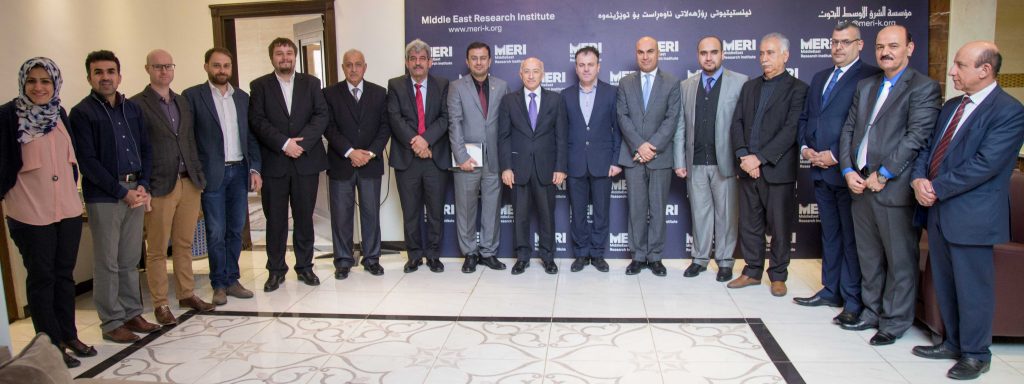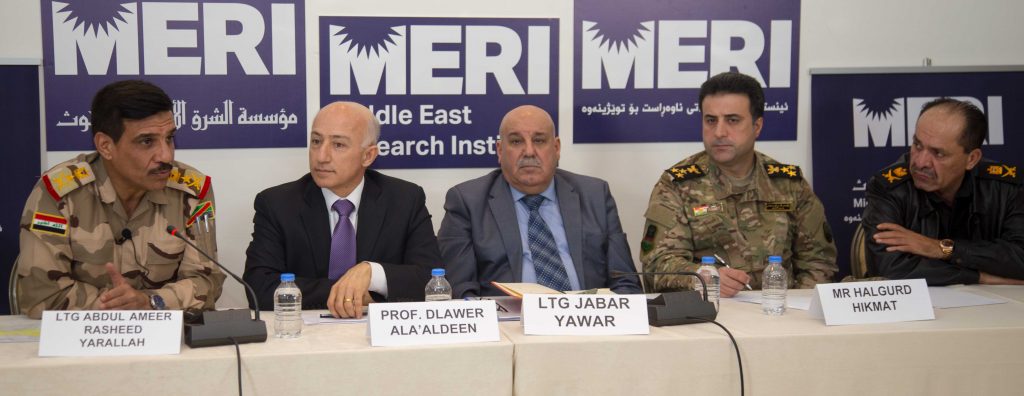“Mosul is the capital of the alleged Caliphate, and it is most critical to completely eliminate this Caliphate, otherwise it will return thereafter” stated the Commander of the Nineveh Liberation Campaign, Lieutenant General (L.G.) Abdul Ameer Rasheed Yarallah, during a roundtable on 26 January.
The meeting was organised by MERI and attended by representatives of Iraq’s leading think tanks and the top military commanders involved in the Nineveh liberation campaign. The event provided a unique opportunity for the two sides to exchange views and debate the process of the liberation of Mosul and its wider implications. Key speakers included:
- G. Abdul Ameer Rasheed Yarallah, Commander of the Nineveh Liberation Campaign
- G. Jabar Yawar, Secretary General of the Ministry of Peshmerga Affairs
- G. Abdul Wehab Alsaidi, Deputy Commander of the Anti-terror Unit
- G. Riadh Jalal Tawfeeq, Commander of the Military Forces
- Adil Abbas Shamal, Head of the Planning Commission in the Joint Operation Command

The speakers provided chronological details of the way the East Mosul was liberated and showed their satisfaction with the effectiveness of communication between the Iraqi forces, Hashd al-Shaabi and Peshmerga forces. Having liberated “more than two-thirds of the city”, according to Yarallah, there are great challenges ahead, including the use of civilians as human shields by IS.
Further discussions focused on the post-liberation phase, including preparations for the return of displaced populations and the promotion of security and stability in Nineveh province. Participants also stressed the importance of restoring trust between security forces and local people, as well as between Peshmerga forces, the Iraqi army and Hashd al-Shaabi in Mosul and beyond.
The video link for this session can be found below:
* * * * *
About MERI: The Middle East Research Institute is Iraq’s leading policy-research institute and think tank. It is an independent, entirely grant-funded not-for-profit organisation, based in Erbil, Kurdistan Region. Its mission is to contribute to the process of nation-building, state-building and democratisation via engagement, research, analysis and policy debates.
MERI’s main objectives include promoting and developing human rights, good governance, the rule of law and social and economic prosperity. MERI conduct high impact, high quality research (including purpose-based field work) and has published extensively in areas of: human rights, government reform, international politics, national security, ISIS, refugees, IDPs, minority rights (Christians, Yezidis, Turkmen, Shabaks, Sabi mandeans), Baghdad-Erbil relations, Hashd Al-Shabi, Peshmarga, violence against women, civil society. MERI engages policy- and decision-makers, the civil society and general public via publication, focused group discussions and conferences (MERI Forum).

